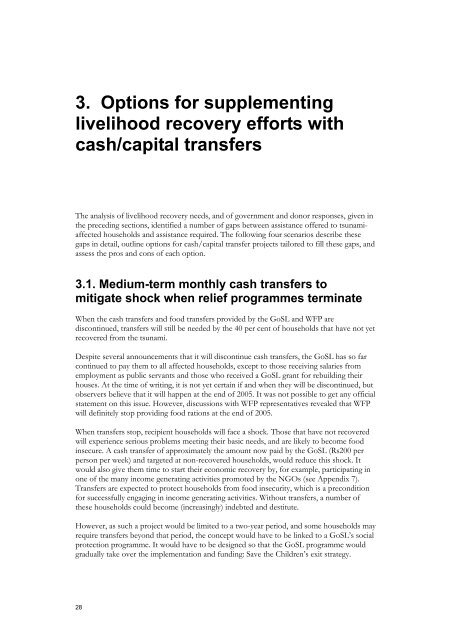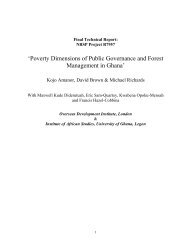Feasibility study on a capital-based income generation scheme for ...
Feasibility study on a capital-based income generation scheme for ...
Feasibility study on a capital-based income generation scheme for ...
Create successful ePaper yourself
Turn your PDF publications into a flip-book with our unique Google optimized e-Paper software.
CASH FOR RECOVERY<br />
3. Opti<strong>on</strong>s <strong>for</strong> supplementing<br />
livelihood recovery ef<strong>for</strong>ts with<br />
cash/<strong>capital</strong> transfers<br />
The analysis of livelihood recovery needs, and of government and d<strong>on</strong>or resp<strong>on</strong>ses, given in<br />
the preceding secti<strong>on</strong>s, identified a number of gaps between assistance offered to tsunamiaffected<br />
households and assistance required. The following four scenarios describe these<br />
gaps in detail, outline opti<strong>on</strong>s <strong>for</strong> cash/<strong>capital</strong> transfer projects tailored to fill these gaps, and<br />
assess the pros and c<strong>on</strong>s of each opti<strong>on</strong>.<br />
3.1. Medium-term m<strong>on</strong>thly cash transfers to<br />
mitigate shock when relief programmes terminate<br />
When the cash transfers and food transfers provided by the GoSL and WFP are<br />
disc<strong>on</strong>tinued, transfers will still be needed by the 40 per cent of households that have not yet<br />
recovered from the tsunami.<br />
Despite several announcements that it will disc<strong>on</strong>tinue cash transfers, the GoSL has so far<br />
c<strong>on</strong>tinued to pay them to all affected households, except to those receiving salaries from<br />
employment as public servants and those who received a GoSL grant <strong>for</strong> rebuilding their<br />
houses. At the time of writing, it is not yet certain if and when they will be disc<strong>on</strong>tinued, but<br />
observers believe that it will happen at the end of 2005. It was not possible to get any official<br />
statement <strong>on</strong> this issue. However, discussi<strong>on</strong>s with WFP representatives revealed that WFP<br />
will definitely stop providing food rati<strong>on</strong>s at the end of 2005.<br />
When transfers stop, recipient households will face a shock. Those that have not recovered<br />
will experience serious problems meeting their basic needs, and are likely to become food<br />
insecure. A cash transfer of approximately the amount now paid by the GoSL (Rs200 per<br />
pers<strong>on</strong> per week) and targeted at n<strong>on</strong>-recovered households, would reduce this shock. It<br />
would also give them time to start their ec<strong>on</strong>omic recovery by, <strong>for</strong> example, participating in<br />
<strong>on</strong>e of the many <strong>income</strong> generating activities promoted by the NGOs (see Appendix 7).<br />
Transfers are expected to protect households from food insecurity, which is a prec<strong>on</strong>diti<strong>on</strong><br />
<strong>for</strong> successfully engaging in <strong>income</strong> generating activities. Without transfers, a number of<br />
these households could become (increasingly) indebted and destitute.<br />
However, as such a project would be limited to a two-year period, and some households may<br />
require transfers bey<strong>on</strong>d that period, the c<strong>on</strong>cept would have to be linked to a GoSL’s social<br />
protecti<strong>on</strong> programme. It would have to be designed so that the GoSL programme would<br />
gradually take over the implementati<strong>on</strong> and funding: Save the Children’s exit strategy.<br />
28
















